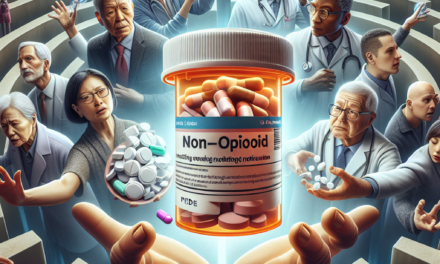Johnson & Johnson Files Lawsuit Against Federal Government Over 340B Rebate Program Suspension

In a significant legal move, Johnson & Johnson has filed a lawsuit against the federal government concerning the suspension of the 340B rebate program. This lawsuit has sparked widespread debate and concern within the pharmaceutical industry, healthcare providers, and policymakers. The 340B program, designed to provide discounted drugs to healthcare organizations serving vulnerable populations, has been a cornerstone of public health policy. Johnson & Johnson’s legal action raises critical questions about the program’s future, its impact on drug pricing, and the broader implications for healthcare access in the United States.
Understanding the 340B Rebate Program
The 340B Drug Pricing Program, established in 1992, is a federal program that requires drug manufacturers to provide outpatient drugs to eligible healthcare organizations at significantly reduced prices. The program aims to enable these organizations, often serving low-income and uninsured patients, to stretch their resources and provide more comprehensive services.
Under the 340B program, eligible healthcare providers, known as “covered entities,” can purchase drugs at discounted rates. These entities include community health centers, children’s hospitals, and other safety-net providers. The savings generated from these discounts are intended to be used to improve patient care and expand services.
However, the program has faced criticism and scrutiny over the years. Some argue that it lacks transparency and oversight, leading to potential misuse of funds. Others contend that the program is essential for maintaining access to affordable medications for vulnerable populations.
- Eligibility criteria for covered entities
- Mechanisms for drug pricing and discounts
- Impact on healthcare providers and patients
- Controversies and criticisms of the program
- Role of the Health Resources and Services Administration (HRSA) in oversight
Despite these challenges, the 340B program remains a vital component of the healthcare safety net, providing essential support to organizations serving underserved communities.
Johnson & Johnson’s Legal Challenge
Johnson & Johnson’s lawsuit against the federal government centers on the suspension of the 340B rebate program. The company argues that the suspension violates federal law and undermines the program’s intended purpose. The lawsuit claims that the suspension has resulted in financial losses for the company and disrupted the supply chain for critical medications.
The legal challenge highlights the tension between pharmaceutical companies and the federal government over drug pricing and access. Johnson & Johnson contends that the suspension of the rebate program has created an uneven playing field, disadvantaging manufacturers who comply with the program’s requirements.
In its lawsuit, Johnson & Johnson seeks to reinstate the rebate program and ensure that it operates in accordance with federal law. The company argues that the suspension has had a detrimental impact on its business operations and the availability of affordable medications for patients.
- Details of the lawsuit and legal arguments
- Impact on Johnson & Johnson’s business operations
- Reactions from other pharmaceutical companies
- Potential implications for the 340B program
- Legal precedents and potential outcomes
The lawsuit has garnered significant attention from industry stakeholders, policymakers, and advocacy groups, all of whom are closely monitoring the case’s progress and potential implications for the future of the 340B program.
Implications for Drug Pricing and Access
The suspension of the 340B rebate program and Johnson & Johnson’s subsequent lawsuit have far-reaching implications for drug pricing and access in the United States. The 340B program has long been a critical tool for reducing drug costs for healthcare providers and patients, particularly those in underserved communities.
Critics of the suspension argue that it undermines efforts to make medications more affordable and accessible. They contend that the rebate program plays a crucial role in ensuring that healthcare providers can continue to offer essential services to vulnerable populations.
On the other hand, some industry stakeholders argue that the program’s suspension is necessary to address concerns about transparency and accountability. They claim that the program has been subject to abuse and that reforms are needed to ensure that it operates effectively and efficiently.
- Impact on drug pricing and affordability
- Access to medications for underserved populations
- Debate over program transparency and accountability
- Potential reforms and policy changes
- Role of pharmaceutical companies in addressing access issues
The outcome of Johnson & Johnson’s lawsuit could have significant implications for the future of drug pricing and access in the United States, shaping the landscape of healthcare policy and regulation.
Case Studies and Examples
To better understand the impact of the 340B program and the implications of its suspension, it is helpful to examine case studies and examples of how the program has been implemented in practice. These case studies provide valuable insights into the program’s benefits and challenges, as well as the potential consequences of its suspension.
One notable example is the use of 340B savings by community health centers to expand services and improve patient care. Many health centers have used the savings generated from the program to offer additional services, such as dental care, mental health services, and substance abuse treatment. These expanded services have had a significant impact on patient outcomes and overall community health.
Another example is the role of the 340B program in supporting rural hospitals and healthcare providers. In many rural areas, hospitals rely on 340B savings to maintain operations and provide essential services to their communities. The suspension of the rebate program could have a devastating impact on these providers, potentially leading to service reductions or closures.
- Community health centers and expanded services
- Rural hospitals and healthcare providers
- Impact on patient outcomes and community health
- Challenges and limitations of the program
- Potential consequences of program suspension
These case studies highlight the critical role of the 340B program in supporting healthcare providers and improving access to care for underserved populations. They also underscore the potential risks and challenges associated with the program’s suspension.
Future of the 340B Program
The future of the 340B program is uncertain, with Johnson & Johnson’s lawsuit serving as a pivotal moment in the ongoing debate over drug pricing and access. The outcome of the lawsuit could have significant implications for the program’s future, as well as for broader healthcare policy and regulation.
Policymakers and industry stakeholders are closely monitoring the case, with many advocating for reforms to address concerns about transparency and accountability. Some propose changes to the program’s eligibility criteria, while others call for increased oversight and enforcement to prevent abuse.
At the same time, there is a growing recognition of the need to balance the interests of pharmaceutical companies, healthcare providers, and patients. Ensuring that the 340B program continues to serve its intended purpose while addressing concerns about its implementation is a complex challenge that requires careful consideration and collaboration.
- Potential reforms and policy changes
- Balancing interests of stakeholders
- Role of policymakers and industry leaders
- Impact on healthcare access and affordability
- Long-term implications for drug pricing and regulation
The future of the 340B program will depend on the outcome of Johnson & Johnson’s lawsuit, as well as ongoing efforts to address the challenges and opportunities associated with the program. As the debate continues, stakeholders must work together to ensure that the program remains a vital tool for improving healthcare access and affordability for all Americans.
Conclusion
Johnson & Johnson’s lawsuit against the federal government over the suspension of the 340B rebate program has brought renewed attention to the complexities and challenges of drug pricing and access in the United States. The 340B program, designed to provide discounted drugs to healthcare organizations serving vulnerable populations, is a critical component of the healthcare safety net.
The legal challenge raises important questions about the program’s future, its impact on drug pricing, and the broader implications for healthcare access. As stakeholders navigate these complex issues, it is essential to balance the interests of pharmaceutical companies, healthcare providers, and patients to ensure that the program continues to serve its intended purpose.
The outcome of the lawsuit and ongoing efforts to reform the 340B program will have significant implications for the future of drug pricing and access in the United States. By working together, policymakers, industry leaders, and advocacy groups can help ensure that the program remains a vital tool for improving healthcare access and affordability for all Americans.





